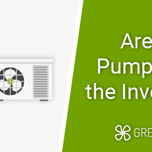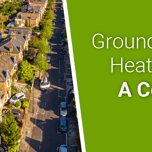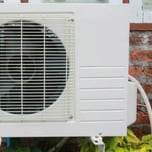
Get up to 4 quotes by filling in only 1 quick form

Slash your energy bills by installing a heat pump

We’ve helped over 500,000 homeowners reduce their carbon footprint
- GreenMatch
- Air Source Heat Pumps
Comprehensive Guide to Air Source Heat Pumps in 2024
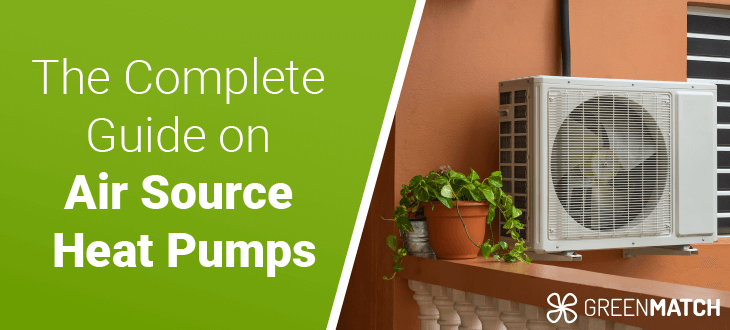
- An air source heat pump extracts heat from the outside air and transfers it to the inside to provide heating and hot water and acts in reverse for cooling purposes.
- On average, installing an air source heat pump costs about £5,000–£18,000. Its running costs reach £1,050 a year and reduce your heating bills by 20%–40%.
- With the most recent update of the Boiler Upgrade Scheme, you can save £7,500 on air source heat pump installation.
In this article, we have prepared a complete guide on everything there is to know about air source heat pumps, their costs of purchasing and running, as well as their benefits.
Interested in an air source heat pump? Save hours on searches for a professional installer by completing our 30-second form. We’ll provide up to 4 free, non-binding quotes from experienced heat pump installers near you. Click the button below to get started.
- Quotes from local engineers
- Payment by finance available
- Save up to £1100 per year
It only takes 30 seconds



- Air Source Heat Pump Guide: Pros & Cons, Savings & More
- What are air source heat pumps?
- How do air source heat pumps work?
- What types of air source heat pumps are there?
- What are the pros and cons of an ASHP?
- What is the cost of air source heat pumps?
- How much can you save with an ASHP?
- How can I prepare my home for an ASHP?
- Frequently Asked Questions
What are air source heat pumps?
Air source heat pumps (also known as ASHPs) are a low-carbon technology that provides efficient heating and cooling solutions for homes in any climate.
They can directly transfer the outside heat rather than generate it by burning fossil fuels, making them an excellent option for your home.
Their installation will automatically translate into lower utility bills and increased energy efficiency in comparison to other conventional heating technologies. Compared to an old G-rated gas boiler, an air-source heat pump can reduce your heating bills by £295 yearly.
In addition to these benefits of air source heat pumps, they are also eligible for the Boiler Upgrade Scheme launched by the UK government back in May 2022.
The scheme is designed to encourage and support homeowners in England and Wales to afford the upfront costs of installing low-carbon heating systems, such as air source heat pumps. The scheme provides grants of up to £7,500 for air source heat pumps for those who meet the eligibility criteria.
How do air source heat pumps work?
Air source heat pumps work by transferring heat from the outside air to water for heating your home through radiators and underfloor heating. ASHP (air to water heat pumps specifically) can be used for both hot water and space heating.
Air source heat pumps work by absorbing heat from the outside air using refrigerant fluid. The heat is then compressed and transferred to your heating system via a heat exchanger. In cooling mode, the process is reversed to provide cooling. These pumps are highly efficient, and capable of extracting heat even in sub-freezing temperatures, making them suitable for cold climates.
Air source heat pumps effectively harness heat from the external environment which makes them a favourable choice for residences in colder regions.
The video below shows how air source heat pumps work in more detail:

What types of air source heat pumps are there?
There are two types of air source heat pumps. The main distinction between the two is how they distribute their heat: through air or water.
Air to air heat pumps
Air to air heat pumps are a specific type of air source heat pump that absorbs heat from the outside air and then transfers it directly into your home, usually via a ventilation fan system.
On average, an air to air heat pump costs around £1,500–£8,000 which could potentially break even in 6–12 years. For a household of 2-4 people the running costs will be around £650–£800 a year.
Air source heat pumps use significantly less energy than a conventional system and are able to switch from heating to cooling depending on the season, acting as an air conditioner during the hot summer months and as a heating source during the winter. This type of heat pump is not only sustainable and efficient but also one of the most affordable heat pumps on the market. They’re even more affordable than their air to water heat pump counterparts. In addition, their lifespan ranges from 10 to 15 years.
Air to water heat pumps
Air to water heat pumps, on the other hand, differ from air to air heat pumps in that they take heat from the outside air and transfer it to a wet central heating system, normally through radiators or underfloor heating. The heat they produce can be used for both central heating and domestic hot water needs.
On average, an air to water heat pump costs between £7,000–£18,000 with projected running costs of around £750–£950 for a 3-bedroom house. In general, air to water heat pumps can pay themselves in 5–10 years.
Air to water heat pumps typically have a lifespan of 10 to 15 years, influenced by factors like the model, location, and maintenance. Despite being pricier than air to air heat pumps, they’re renowned for exceptional efficiency, reaching up to 400 percent under optimal conditions.
While air to air pumps excel in cooling and cost-effectiveness, air to water pumps offer central heating, underfloor heating, and hot water without a separate system, producing water at low temperatures. Choosing between them boils down to personal preference and the building’s specific heating and cooling requirements.
Hybrid heat pumps are another type of heat pump, especially for homeowners with high heating demands. A hybrid heat pump uses both a heat pump and a boiler for heating and cooling. It switches between them depending on the season and temperature.
To find the right air source heat pump for your home, consult a heating engineer for an assessment and quote.
Finding a trustworthy heat pump expert on your own can drag on for days. Fill out a 30-second form, and we’ll connect you with up to 4 vetted heat pump installers. Compare quotes with no obligation, making the process quick and easy. Click below to get started!
- Quotes from local engineers
- Payment by finance available
- Save up to £1100 per year
It only takes 30 seconds



Air source heat pump efficiency
According to the latest data air source heat pumps are 300% efficient, with air to water heat pumps being 200% to 400% on average and air to air heat pumps being 300% efficient.
| Heat pump efficiency | |||
|---|---|---|---|
| Type | Air to water heat pump | Air to air heat pumps | Ground source heat pumps |
| Efficiency | 200% – 400% | 300% | 350% |
What are the pros and cons of an ASHP?
There are many pros and cons to domestic air source heat pumps, and it’s important to be aware of them before making an investment. A summary of the air source heat pump pros and cons can be seen below:
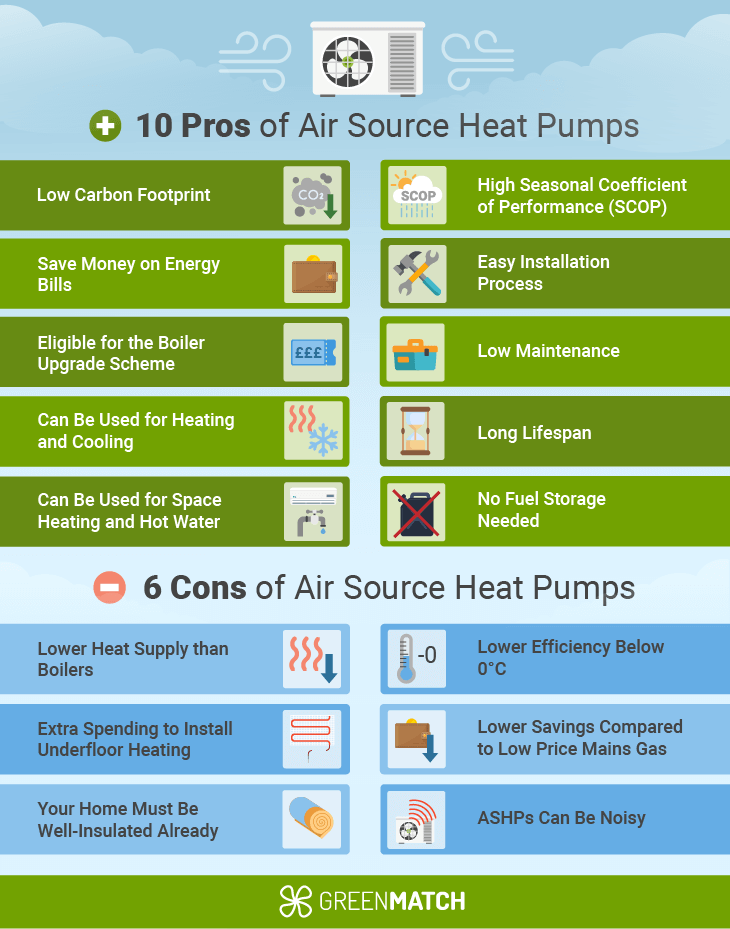
There are numerous benefits to using heat pumps, but here are the most important advantages of purchasing an air source heat pump:
- Low carbon footprint: ASHPs are a low carbon emissions heating option, as they use the outside air to heat or cool homes at a highly efficient rate. For every 3-4 units of energy produced, only 1 unit of electricity is used.
- Money saving: Switching to air source heat pumps can reduce your annual fuel bill by as much as £1100, with larger savings for those switching from electric, coal, or LPG systems.
- Boiler Upgrade Scheme: The £7,500 voucher from the Boiler Upgrade Scheme is available for the installation of air source heat pumps, ground source heat pumps, or biomass boilers. The scheme aims to encourage the adoption of low carbon heating technologies and runs until April 2028.
- Heating and cooling: Depending on the model, ASHPs can be used for both heating in the winter and cooling in the summer.
- Space and hot water heating: An ASHP can also heat water if the flow temperature is around 55°C. If it’s only for space heating, the flow temperature will be 35°C.
- Easy installation: Air source heat pumps can be installed in as little as 2 days, without the need for digging like ground source heat pumps. They are suitable for both retrofits and new builds and can be cost-effective when combined with other building work.
- Low maintenance: Air source heat pumps require little maintenance. It should have annual servicing by a qualified heating engineer. The occasional cleaning of filters and checking for leaks and refrigerant levels can be done by the homeowner.
- Long lifespan: Air source heat pumps have a long lifespan, with proper maintenance, they can operate for up to 20 years and most have 5-year warranties. Some models are even capable of working efficiently for close to 25 years.
- No fuel storage: No fuel storage is needed with ASHPs, because the fuel used is the outside air. That means no additional fees for fuel deliveries like with biomass or oil-fired boilers.
While air source heat pumps are known for their versatility and affordability, there are some disadvantages you should be aware of.
Disadvantages of air source heat pumps in the UK
These are the main air source heat pump disadvantages:
- Lower heat supply compared to boilers: Air source heat pumps have a lower heat supply compared to oil and natural gas boilers. So larger heat-emitting surfaces (like larger radiators) might be required for the same amount of space heating.
- Need for a well-insulated home: An ASHP requires a well-insulated home to work effectively, similar to any other heating system.
- Lower efficiency below 0°C: Air source heat pumps lose efficiency below 0°C because they rely on outside air, and the overall heat output decreases as the temperature drops.
- Lower savings compared to cheap mains gas: The difference between the cost of mains gas and electricity (for powering an air source heat pump) might not be significant if your mains gas is cheap. However, the future of the UK is focusing on increasing heat pump installations significantly and you can expect to have more low-carbon incentives to make the switch.
- Noisy operation: Air source heat pumps can be somewhat noisy when they are running, comparable to a regular air conditioner or light to heavy rain. However, advancements are being made to reduce the noise levels.
Many of the downsides above can be prevented by having the air source heat pump system installed by professionals. Keep in mind that you will need to take proper care of your heat pump to ensure that the efficiency stays up to par and the running costs remain low.
What is the cost of air source heat pumps?
ASHP prices range between £1,500 to £18,000, including installation. The air to air heat pumps will cost you around £1,500–£8,000 and the air to water heat pumps cost anywhere between £7,000–£18,000.
The starting air source heat pump costs are 50% cheaper than the cost of ground source heat pumps. This wide range in price is due to the fact that the air source heat pump installation complexity varies and there are different types of air source heat pumps, brands, sizes, and performance efficiencies that all determine the price.
| ASHP system type | Average price | Avg yearly running costs | Avg yearly savings |
|---|---|---|---|
| Air to water heat pump | £7,000–£18,000 | £750–£950 | £1,000–£1,200 |
| Air to air heat pump | £1,300–£8,000 | £850–£1,050 | £750–£950 |
These prices are broad estimates based on the current market rates in 2023. For a more accurate price, you should always get quotes from multiple installers.
While the prices we offer are estimates based on actual installations, it is difficult to predict your exact air source heat pump and running costs. These will vary depending on many factors. We’ve listed the main ones to account for below.
- The size of your home: Larger homes necessitate bigger heat pumps, which come with a higher price tag. Opting for a more powerful heat pump can result in substantial savings on installation, energy, and maintenance costs.
- The brand of the pump: The choice of heat pump brand impacts costs, with some brands being pricier but potentially offering higher quality and efficiency. Researching different brands and models helps find a suitable option that aligns with both needs and budget.
- The pump size: While larger heat pumps are more expensive, they may be essential for adequate heating.
- The CoP of your pump: Higher CoP signifies greater efficiency, though more efficient heat pumps tend to be costlier and less common.
- Property heating demands: Consider the heating demands of your property, influenced by factors like climate, insulation, and occupancy. A heat pump that is too small may struggle to maintain comfort in harsh weather, while an oversized one can be inefficient and lead to additional installation expenses.
- Any home renovating costs: Installation of ductwork, if not already present, can significantly increase heat pump installation costs, ranging from £250 to £12,000 depending on home size. Ductless mini-split systems are an alternative for smaller homes, eliminating additional ductwork expenses.
When receiving quotes for air source heat pump installation, ensure they cover all costs, including labour and additional work. To simplify the process, use our form to connect with up to 4 trusted local installers to make sure you’re not being overpriced. Get started by clicking the button below.
- Quotes from local engineers
- Payment by finance available
- Save up to £1100 per year
It only takes 30 seconds



What are the running costs of an ASHP heating system?
The running costs of air source heat pumps range from £650 to £1150 and they largely depend on the system size and efficiency. The bigger the size, the more energy it will generate, and the more expensive it will be to run.
The running costs also depend on whether you choose an air to air or an air to water heat pump.
| Heat pump type | 1 bedroom | 2-3 bedrooms | 4+ bedrooms |
|---|---|---|---|
| Air to air | £650–£850 | £750–£950 | £850–£1050 |
| Air to water | £750–£950 | £850–£1050 | £950–£1150 |
If you have a well-insulated home and live in a mild climate, you can expect your running costs to be lower. If you have a poorly insulated home or live in a cold climate, you can expect your running costs to be higher.
The efficiency of the system is equally important to consider. Air source heat pump performance is said to be more efficient in warmer climates, however, this does not mean they are not cost-effective during the UK’s cold weather. They generally start to function slightly worse in temperatures lower than 0°C. Fortunately, the UK winters typically do not drop far below 0°C.
Moreover, your home’s insulation and your own energy needs will therefore also impact the running costs. To begin with, your home should be well-insulated to get the most out of your heating system. Additionally, how much heating you require will also determine how much you spend on your bills.
Air source heat pumps are highly efficient, using minimal electricity to absorb heat from the outside air, delivering up to three times more heat energy to your home than they consume in electricity.
However, their performance can decrease in very cold temperatures, making ground source heat pumps a more reliable option for year-round use as they extract heat from the ground.
Financing a heat pump system with a grant
If you decide to buy an air source heat pump, you may be eligible to receive some government support in the form of a heat pump grant.
There are two beneficial grants you may apply for:
- Boiler Upgrade Scheme (formerly known as the Clean Heat Grant). It replaced the now-expired Renewable Heat Incentive (RHI). In this scheme, you may be eligible for up to £7,500 off the cost and installation of an air source heat pump.
- 5% VAT reduction on energy-saving products, which includes air source heat pumps, solar panels and more.
To finance your air source heat pump affordably, consider obtaining up to 4 quotes from different installers, reducing the risk of overpaying. GreenMatch simplifies this process by offering you up to 4 free, non-binding quotes from trusted local installers after answering a few brief questions about your heating needs, saving you hours of time and effort.
- Quotes from local engineers
- Payment by finance available
- Save up to £1100 per year
It only takes 30 seconds



How much can you save with an ASHP?
If you purchase an air source heat pump you will be able to save energy and money! This is due to the efficiency levels at which air source heat pumps produce heat energy. You could save up to £1,100 annually depending on where you live and what system you’re switching from.
The efficiency of an air source heat pump is measured by the Coefficient of Performance (CoP). It shows how many kilowatts of heat are produced by using 1 kilowatt of power and ranges between 1 and 5. The higher the CoP is, the more heat is transferred and the lower energy consumption is
The example below shows that a heat pump with a CoP of 4 will produce four times more heat than it uses.

Most air source heat pumps have a CoP between 2 to 4, but in some cases, it can be as high as 5. So if you’re wondering “are air source heat pumps any good?” then the answer is yes.
| England, Scotland, & Wales | Northern Ireland | |||
|---|---|---|---|---|
| Fuel bill savings | Carbon savings | Fuel bill savings | Carbon savings | |
| Old (G-rated) gas boiler | £295 | 2,900kg | £800 | 2,900kg |
| Old electric storage heaters | £1,100 | 2,000kg | £1,200 | 2,000kg |
| Old (G-rated) oil boiler | £550 | 4,400kg | -£270 | 4,400kg |
| Old (G-rated) LPG boiler | £560 | 3,400kg | £690 | 3,300kg |
Moreover, even though switching to an air source heat pump from an oil boiler in Northern Ireland does not translate into monetary savings, it still has a positive impact on CO2 savings, and thus is an aspect to take into account for more environmentally friendly alternatives.
All homes will have different annual saving amounts –and it’s difficult to account for all cases– but we’ve provided an example that will hopefully help you understand how much you can save.
In our example, we will look at how much energy an average 4-person household will need and how much they’ll spend on running costs on an air source heat pump versus a gas condensing boiler. We will look at an average 96m2 semi-detached house with 3 bedrooms.
| Annual Running Costs of an ASHP | Running Costs of a Gas condensing boiler | |
|---|---|---|
| Calculations | ||
| Heating demand | 12,000kWh | 12,000kWh |
| Average CoP | 3 | 90% |
| Fuel price* | 27p/kWh | 7p/kWh |
| Standing charge | 53p/kWh | 30p/kWh |
| Running costs | £1,200 | £1,067 |
| Carbon emission | 844kg | 2,532kg |
While air source heat pumps cost just slightly more to run, it’s worth noting that by using an air source heat pump you save up to 7,500kg of CO2 every year. That’s equivalent to 11,280 miles driven by an average gasoline-powered passenger vehicle. Apart from environmental benefits, ASHPs increase the value of your home, making it a more attractive proposition to potential buyers.
How can I prepare my home for an ASHP?
Before you take the step of buying a domestic air source heat pump, there are a few things to prepare to make sure you have a successful ASHP installation that maximises how much you save.
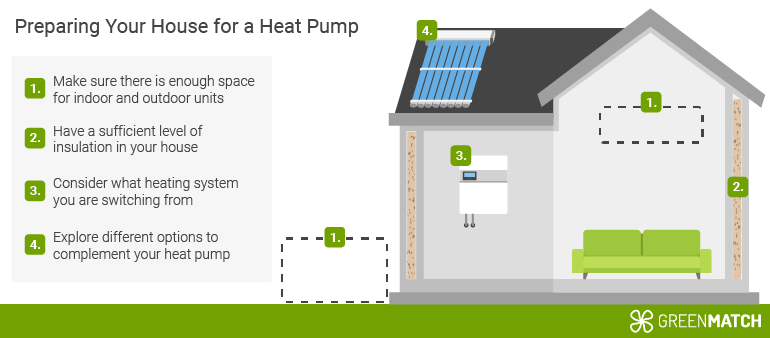
Before you take the step of buying a domestic air source heat pump, there are a few things to prepare to make sure you have a successful ASHP installation that maximises how much you save.
- Adequate space: Consider various factors when positioning air source heat pumps, including ensuring a good air supply, minimising pipework, and providing ample space for airflow and maintenance access. Ideally, place the ASHP outside in a garden corner with steady airflow and minimal obstructions for optimal performance.
- Insulation: Enhance wall, loft, and draught-proofing for maximum efficiency with your heat pump.
- Energy Performance Certificate (EPC): Obtain an EPC to assess your home’s energy efficiency and receive tailored recommendations from certified installers.
In the UK, an Energy Performance Certificate is essential before contacting a heat pump installer, providing an efficiency rating (A to G) and cost/emission estimates. After an EPC assessment by an accredited assessor, use GreenMatch for fair heating system quotes. Recent property buyers may already possess a valid EPC, verifiable through the government portal.
- Current heating system: Consider switching from electric or coal-based heating for faster cost savings, especially with air to water heat pumps for underfloor or warm air heating.
- Complementary options: Combine your heat pump with building improvements, a boiler, solar panel heating, or other renewable energy sources to lower costs and reduce your carbon footprint.
- Talk to the installer: Ask the right questions to ensure you choose a qualified installer.
But before you’re ready to ask your installer questions, you first need to compare installers to find the one offering the best quote. As we see it, there are two ways to go about this: the hard way and the easy way.
- Spend hours scrolling through the internet, clicking through various websites.
- Work out which installers are based in your area.
- Find the contact details and ring each installer one by one.
- Explain your situation and repeatedly share your details to different installers.
- Once you’ve finally collected all your quotes, go back and forth comparing them.
- Simply click the button below and fill in your details only once.
- Receive up to 4 free quotes from qualified installers in your area and compare them side by side.
To get started with the easy way, just click the button below and answer some short questions about your heating situation.
- Quotes from local engineers
- Payment by finance available
- Save up to £1100 per year
It only takes 30 seconds



Is an air source heat pump something for your household?
All in all, after reading this guide it can be concluded that air source heat pumps are an excellent option for your household and sport the following advantages:
- Environmental friendliness: Provide efficient and eco-friendly heating and cooling.
- Versatility: Suitable for various applications, including residential use.
- Cost-effectiveness: Easier and more affordable installation compared to ground source heat pumps.
- No land excavation: Installation does not require digging up land, reducing upfront costs.
- Energy efficiency: Outperform traditional boiler systems in terms of efficiency.
- Financial incentives: Eligible for grants like the Boiler Upgrade Scheme, offering up to £7,500.
- Comparable costs: Installation cost is equivalent to that of a new boiler, ensuring budget-friendly options for homeowners.
Luckily, here at GreenMatch, we are here to help you by providing up to 4 completely free and no-obligation quotes so you can easily get in contact with our trusted network of suppliers that can guide you through the process instead of spending countless hours searching for professionals yourself.
To get started, just click the button below and answer some short questions about your heating situation
- Quotes from local engineers
- Payment by finance available
- Save up to £1100 per year
It only takes 30 seconds



Frequently Asked Questions

Valli has been writing well researched articles about renewable energy, sustainability and green technologies for GreenMatch since 2017. Her work has been published in various media such as Entrepreneur, Business Insider, Canadian Geographic, uSwitch, and eCycle.
 We strive to connect our customers with the right product and supplier. Would you like to be part of GreenMatch?
We strive to connect our customers with the right product and supplier. Would you like to be part of GreenMatch? - Air Source Heat Pump Guide: Pros & Cons, Savings & More
- What are air source heat pumps?
- How do air source heat pumps work?
- What types of air source heat pumps are there?
- What are the pros and cons of an ASHP?
- What is the cost of air source heat pumps?
- How much can you save with an ASHP?
- How can I prepare my home for an ASHP?
- Frequently Asked Questions




